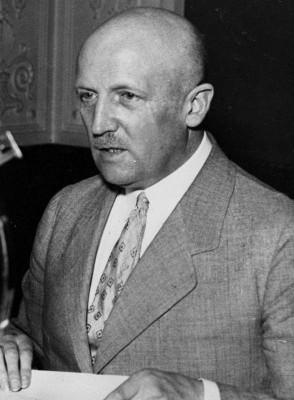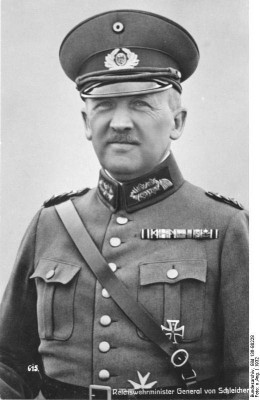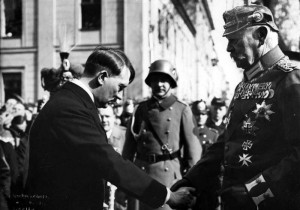Kurt von Schleicher (1882-1934) was the last man to be German Chancellor during the Weimar Republic, the era before the rise to the Chancellorship of Adolf Hitler. As one of Germany’s most prominent generals in the years after World War I, he exercised considerable power. After the Nazis had taken over the country entirely, Schleicher withdrew from public life. He was assassinated, along with his wife, by killers acting for Hitler in June 1934.
Early Life and Upbringing
Schleicher was the son of an officer from Prussia and the daughter of a ship owner. His birthplace was Brandenburg an der Havel, and he attended a school for the training of army cadets. Upon his graduation, he was commissioned as a second lieutenant in the German army. During this period of his life, he met two men whose friendship would be important to him throughout his life.
While at the cadet school, Schleicher met Franz von Papen, later to be Chancellor himself as well. After he became an army officer, he made friends with Oskar von Hindenburg, who was in the same regiment (the Third Guards) as Schleicher. He served throughout World War I as a member of the staff of the man who was to become his patron, Wilhelm Groener.
After World War I
After his retirement from front line service, Schleicher was quietly successful in the German army of the 1920s, gradually working his way up to become an important point of liaison between officials of the civilian government and the military. His preferred methods involved working without drawing attention to himself, making use of sympathetic contacts in the press and relying on a web of informers to tell him about the plans of other departments of the government. This allowed him to make a success of his post in charge of the Office of Ministerial Affairs.
Schleicher’s social views were generally somewhat authoritarian in nature. He believed that the Weimar Republic was decadent and that society required much more discipline and order. However, he also took the view that the army had a role to play in bringing all elements of German society together. In practical terms, he took a moderate stance, sometimes opposing policies which he felt were unreasonable, such as the Osthilfe initiative which aimed to help bankrupt estates lying east of the Elbe.
Rise to the Chancellorship
At the start of the 1930s, the government of Heinrich Brüning gave Schleicher an opportunity to increase his influence behind the scenes. At first he served as an aide to the Minister of Defense, Wilhelm Groener. Schleicher worked to build a relationship with Paul von Hindenburg, the German president, which brought tensions with both Groener and Brüning. By May of 1932, Schleicher had cultivated quiet plots and whispering campaigns against both men, which played a significant part in their removal from the government.
Schleicher had a major part in the selection of Franz von Papen, the new Chancellor, and he was rewarded with the post of Minister of Defense. In this job, he maintained his relatively moderate stance, differentiating himself from Papen with a broadcast in 1932 in which he stated his utter contempt for the notion of a military dictatorship. The two men eventually had a falling out and the inconclusive election of November 1932 gave Schleicher the chance he needed. Papen, who was unable to gain majority support in Parliament, resigned and Schleicher took on the role of German Chancellor.
Schleicher as Chancellor
At first, Schleicher had intended to form a coalition capable of maintaining a majority in the Reichstag. In order to do this, his plan was to put together a participatory – but somewhat authoritarian – regime around which he could unify the many and frequently squabbling special interest groups that existed in Germany during that time. Some of the groups that Schleicher extended offers to included the Christian and social democratic labor unions and a section of the Nazi party. This was not the one that was led by Hitler, but an already under-pressure, more leftwing faction headed by Gregor Strasser.
Despite some apparent progress in the early days, all the parties involved rejected Schleicher’s advances. Papen, meanwhile, had become closer to Hindenburg; the president was becoming increasingly uneasy about Schleicher’s plan, especially as it involved the social democrats, who Hindenburg detested. The aging president was repeatedly urged by Papen to make Hitler the new chancellor, if necessary in coalition with the nationalist German National People’s Party or DNVP. The idea was that the DNVP and Papen would be able to moderate the excesses of the Nazis.
Fall and Assassination
Papen, meanwhile, was in the process of holding a number of meetings with both Hindenburg and Hitler; these were all kept secret, especially from Schleicher. Although Schleicher asked Hindenburg to grant him emergency powers, the president refused this request and was also unwilling to allow the Reichstag to be dissolved once more. On January 30, 1933, Hindenburg removed Schleicher from office, after which he immediately asked Adolf Hitler to take up the post of chancellor.
After having been forced out of office, Schleicher was involved in a number of attempts to bring the House of Hohenzollern back to power and restore Kaiser Wilhelm to the German throne. Hitler was deeply alarmed at the notion, worrying that such a move might end with the overthrow of his own leadership and which could lead to his Nazi dictatorship collapsing altogether. Schleicher, who had already been considered a possible assassination target by Hitler, was now very much in his sights. On June 30, 1934, the so-called Night of the Long Knives gave Hitler his opportunity.
Schleicher was at home and died in a hail of bullets. His wife, on hearing the shots and coming to aid her husband, was also gunned down. Schleicher’s stepdaughter eventually discovered both of their bodies. On July 13, Hitler gave a speech in which he denounced Schleicher to the Reichstag, claiming that he and Ernst Röhm had been plotting a coup. Some historians suggest that Schleicher’s stepdaughter was later killed after she tried to kill Hitler herself, although this was never confirmed.


